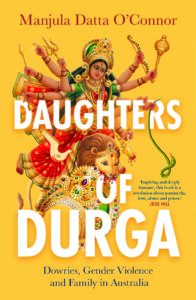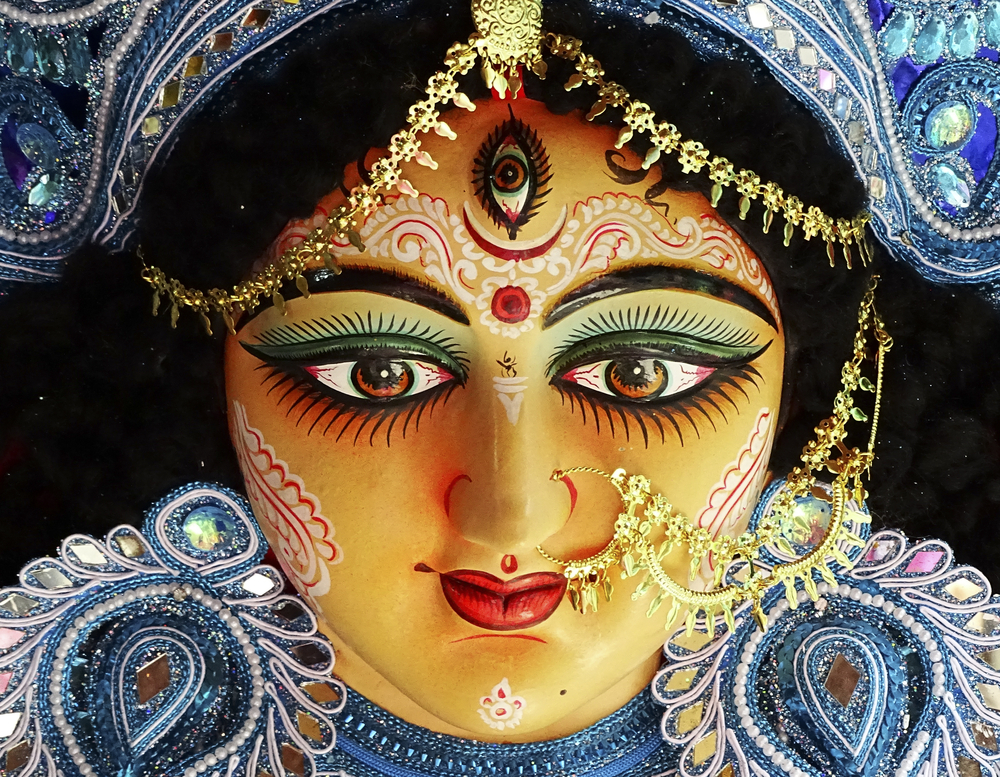Manjula Datta O’Connor’s book, Daughters of Durga, is an incisive investigation of domestic violence in South Asian communities, and the resilience of women in the face of adversity. Here she talks with Jesse Blakers and Ginger Gorman about her research and the public’s reaction to her work.
In a nutshell, what is your book, Daughters of Durga, about?
Daughters of Durga aims to highlight the enormous positive cultural heritage of India’s women dating back to 5000 years. Yet this culture that illustrates respect and reverence of women, exemplified by the goddess Durga (the goddess of power), also contains contradictory pressures.
Patriarchal dominance and oppression of women starts from conception through to birth: through the course of the life cycle, through domestic violence, dowry murders, to women of old-age. This wise ancient culture is in need of change. In writing the book, I have tried to capture the role of family and culture in perpetration of domestic violence, while highlighting the cultural strengths that are protective and confer resilience to victim-survivors.
Why did you decide to write about something so confronting?
In my practice as a psychiatrist, I treat victims of gender based violence associated mental disorders, including post-traumatic stress disorder and depressive illness. While treating these women, I have learned of various forms of oppression in the context of marriage, such as domestic servitude, economic abuse and demands for dowry (i.e. oversized gifts, cash, gold).
These stories need to be shared. In sharing, I hope to encourage open and honest discussion around how to strengthen those cultural practices that are protective and empowering for women and encourage change.
Are there any specific incidents in the book that really stay with you?

Daughters of Durga’s cover
There are many stories I remember well: women being told by their new family – the husband’s family – ‘do not ring your family. You belong to this family now.’ Their phones would be monitored or removed.
Soon after her wedding, a woman was told by her mother-in-law that her parents had disrespected and dishonoured her, the groom and the family. Why? Because the gifts given as dowry were not lavish enough. The bride’s father in India was humiliated and shamed. Soon after he suffered a stroke, and the bride endured emotional and physical violence by multiple perpetrators both in India and after moving to Australia. She was forced to call the police as she feared for her life.
Her mental health was severely affected, manifesting in Post Traumatic Stress Disorder and suicidal ideation. After 18 months this young woman illustrated incredible resilience: she has had a successful recovery, became a teacher and has since remarried a very lovely young Indian-Australian man.
That is why I called the book Daughters of Durga: throughout their recovery process, the women imbibe the power of the goddess Durga.
I find the way you weave together history, your personal experiences as a psychiatrist, and the lived experiences of women in India and Australia incredibly impactful. What was the process of melding these stories and histories together like?
It was quite spontaneous. In my consultations when I speak to my patients I naturally think of my own life and my extended family back in India. During the writing process the thoughts became much more explicit and clear.
I saw how a reasonably happy family like mine could easily become toxic and abusive had the patriarch of my family wanted to abuse his power. My father was in some ways all powerful.
But luckily for us, he was a generous and caring father, husband, son and uncle to the extended family. There were times when he illustrated coercive or controlling behaviour, but he would not see it as that: he was being protective, and it was done in a loving manner. So, your conscious mind would not object to this. As I learned from my mother some 17 years later, we felt powerless rage.
And perhaps that is why I chose the path of sharing my personal stories: I want to encourage our community to create a culture where women are recognised as having intelligence and good sense, are allowed to make decisions and have their choices respected.
You discuss dowry abuse and the ways the dowry system privileges men over women in the book. Tell me about that.
Dowry in ancient times was and still is a gesture of goodwill towards the bride: it’s a pre mortem inheritance for the girls. Because our culture is patrilineal and the inheritance goes to boys, dowry is compensation for this. The laws of India have changed, and the Indian constitution gives equal rights and equal inheritance to the girls. But daughters often do not claim their inheritance, fearful of alienating their brothers support.
Dowry – such as oversized gifts consisting of household items, white goods, cash, gold, diamonds, cars, even a house – for the groom and extended family has become gifts not just for the bride but for the groom and his family.
The practice has become distorted, giving rise to a sense of entitlement within some men and their families over the wealth of the bride’s parents.
Dissatisfaction with the number of gifts received can give rise to abuse, abandonment and, in some cases, even murder. In 2015 we saw a case of murder related to coercive violent demands for cash in Melbourne. The coroner’s inquest noted coercive dowry demands before, during and after the marriage. Yet the significance of dowry demands was not recognised.

Manjula Datta O’Connor’s decision to take on domestic abuse led to some backlash within the South Asian community. Picture: Supplied.
As you discuss, the South Asian community is often patriarchal and not necessarily open to scrutiny. What has been the response to your book? Have you had any backlash?
I’m pleased to say that I have received good support from many people of South Asian community. They recognise that this is a real problem that needs a culturally nuanced response. The families of victim-survivors have been very supportive as well. And some faith leaders have openly supported me.
Nevertheless, there is a significant proportion of the community who believe I am doing it for some personal agenda, for my publicity, or even to enhance my clientele base. There have been attempts to isolate me from the community, not inviting me to cultural events.
In 2016 a number of organisations (headed by patriarchs) wrote a petition against the dowry abuse campaign I led and presented to Victorian MPs. The same MPs advised me what was being said against me at that time. Despite this, I am pleased to say that we secured the support of the Victorian Parliament and the Victorian Family Violence Protection Act was changed in 2019, which now includes dowry abuse in the meaning of family violence.
You speak about your work with the Australasian Centre for Human Rights and Health (ACHRH) in the book. How did your role at ACHRH influence ‘Daughters of Durga’?
ACHRH has been the tool through which I have translated research for the communities and intern working with the community generated action research. It has allowed me to publish academic papers arising directly from our community work, becoming the most influential tool in my toolbox.
We have run community education programs and during that process I have learned a lot about what the community needs and what kind of knowledge would be most useful.
The book explores the differences and similarities in how Indian women are treated in India and Australia. What is something you hope readers take away from these cross-cultural discussions and analyses?
Any prevention and early intervention programs for family violence need to have tools that are specific to the cultural language and practices. Abuse of power, gender inequality and lack of choices for women are universal aspects of domestic violence. But the tools used by perpetrators are different in each cultural group.
Generalised prevention programs are not going to be as effective as culturally specific programs that are designed by the community and for the community. I hope Daughters of Durga will create honest discussion amongst policymakers and politicians around the culturally and linguistically diverse (CALD) community requirements.
There is no debate that multiculturalism is a good thing, and we need to espouse it. But prevention of domestic violence programs need to be ethno-specific. And both ideas can run in parallel.
Daughters of Durga is out now.
-
Feature image: A close up on the face of an idol of Goddess Durga, symbol of strength and intensity as per Hinduism. Picture: Shutterstock/Ankit M






